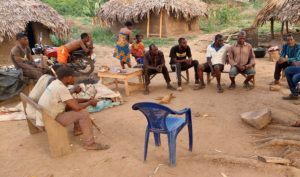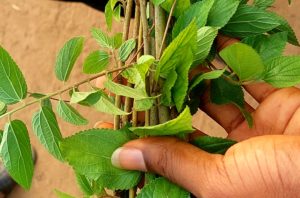Mr Godwin* leads a colony of people in Odido, a settlement geo-located in Ago Aduloju ward, just on the outskirt of the State capital, Ado-Ekiti. He is highly revered by his people, who are majorly of the Tiv ethnic group, but sparingly, speak Hausa and Yoruba language.
Many of Godwin’s kinsmen, together with Hausa and Fulani people, have journeyed many miles from the Northern region of Nigeria (Africa’s most populous country) to make their shelters of clay and leaves in the woodland of Ago Aduloju.
Ago Aduloju takes a little portion from the 502,996 total population in Ado LGA. It is one of 13 wards domiciled in the LGA. Mr Godwin and his fellow Tiv people live very far from Ado Metropolitan.

In the first week of March, 2022, a farmer, who will be referred to as Pius* in this story, lost his 9-month-old daughter, Doosur* to a suspected maculopapular rash illness after showing clinical signs and symptoms of rashes, conjunctivitis, cough and fever which fit the case definition of measles. The standard case definition for Measles is any person with fever and maculo-papular rash and at least one of the following signs and symptoms: cough, coryza, conjunctivitis.
Maculopapular rash is defined as rash that contains both macules and papules. Maculopapular rashes are associated with the common cold virus (rubella), which is also known as German Measles. Measles is caused by an extremely contagious virus called morbillivirus, it is spread by contaminated droplets that spread through the air when you cough, sneeze or talk, according to Cleveland Clinic.
Doosur and four other children within the age range of 1-4 (year) died before the community could alert the State Disease Surveillance Unit and Rapid Response Team (RRT) of the State Ministry of Health and Human Services. The surveillance system (headed by State Epidemiologist and State Disease Surveillance & Notification Officer) in the State is very strong and sensitive, giving room to a formidable Local Government Area (LGA) Rapid Response Team (RRT) which contains LGA DSNO, ADSNO, Laboratory focal and Health Educator.
The State Disease Surveillance team makes it home in the Surveillance and Epidemiology Unit of the State Ministry of Health & Human Services. It is noteworthy to state that the unit won the Nigeria Centre for Disease Control (NCDC) Best Performing State in Disease Surveillance in 2021.
Efforts have been put in place by the unit to monitor diseases trends and promptly respond to outbreaks of any disease. Communication is very important in any organization. The channel of information is in two-way. Report comes from the community to the LGA, then the LGA notifies the State. The State gives feedbacks on reports sent from the LGA level.
According to the State team, the LGA got a notification from a community informant of suspected cases of Febrile Rash Illness (FRI). The report has it that 25 children living in the settlement came down with what is suspected to be cases of FRI.
The community has always relied on traditional and alternative medical care in lieu of Basic healthcare.
State Efforts To Respond to the Outbreak
Amidst the barriers of navigation to the settlement, the LGA RRT, promptly, visited the settlement to conduct a preliminary outbreak investigation. During the investigation, community survey of under 5 & above 5 children were sampled to ascertain the immunization coverage in the area.
A child is considered adequately immunized against measles after receiving one dose of vaccine, according to World Health Organization (WHO).
During community survey, 118 households were surveyed. The measles vaccination status of the eligible children in the community was assessed and found to be suboptimal. The survey revealed eight persons (6.7%) have vaccination history while 110 persons (93.2%) have no vaccination history. The data above showed that the settlement has low vaccination coverage.
Along with the community survey, active case search for more cases was also conducted in the settlement and health facilities located in the ward.
While the preliminary investigation was conducted, blood samples of five currently symptomatic children were collected and sent to the Central Public Health Laboratory, Yaba, Lagos State. Since the clinical signs and symptoms presented by Doosur (before her death) and other 24 children were rashes, conjunctivitis, cough and fever, it was imperative to ascertain the mode of transmission and severity of the disease by laboratory diagnosis.
After 7 days, the CPHL sent laboratory results to the State, where it was revealed that four (4) out of the five samples sent to the laboratory were confirmed as positive cases. Hence, Doosur and four other children that died are probable measles cases. A probable case is any person that presented with any of the signs and symptoms associated with a particular disease case definition and died without a confirmatory diagnosis.
Hence, the results prompted the State RRT to support the LGA team to further conduct an outbreak investigation along with Risk Communication and Community Engagement (RCCE).
The presence of State officers provided technical aid and guidance to the LGA team. The State team conducted community sensitization to encourage the uptake of Measles vaccination and other Routine Immunization (RI) antigens. The team health-educated Godwin and his people on Measles and why it is very important to keep a hygienic environment. The team also questioned the community on the contiguity of the confirmed and probable cases.
On Basic Amenities Lacking and Alternative Care Utilized by The Community
Pius was among the people quizzed by the State team. He is semi-illiterate but was still able to speak, in a subtle tone, on the outbreak and needs of his people. He said the distance of the settlement away from the city pose a big challenge for any public health intervention and provision of basic amenities which include water, electricity and good road network to reach the inhabitants of Odido. “We have lacked basic healthcare in this settlement due to the non-motorable road and long distance away from the town. We need mosquito nets and many other basic amenities. My child and four other kids were so unfortunate because if there was provision of healthcare, they would have survived.”
Pius’ comments reaffirm that to get it right with the Universal Health Coverage (UHC), the Basic Health Care Provision Fund (BHCPF) must be judiciously utilized to the length and breadth of underdeveloped areas.
BHCPF & Other Public Health Intervention
The BHCPF is predominantly financed through an annual grant from the federal government of not less than one percent of the Consolidated Revenue Fund (total federal government revenue before it is shared to all tiers of government). The scheme was established under section 11 of the National Health Act as a catalytic funding to improve access to primary healthcare, according to the National Primary Healthcare Development Agency (NPHCDA).
However, management of diseases and responses to outbreaks are chiefly funded by international donors like WHO, CDC, UNICEF, Bill & Melinda Gates Foundation (BGMF), USAID and others, as the government only spends 4% of its budget on healthcare. The aim of the National Health Act of 2014 is to channel the BHCPF to the most neglected part of the health system. This fund is disbursed to provide basic minimum package of Health services, renovation and construction of PHCs and also emergency medical treatment.
Ago Aduloju Basic Health Centre is the nearest basic health facility to the settlement and it is about one hour drive to the settlement. The pathway to the settlement is not motorable, hence, there is no fluid access to basic healthcare services. It is ideal to say that the bad road network contributed to poor patronage and underutilization of the BHC in the ward.
“The BHC is open to everyone in this ward for patronage of our services. We are usually available for patients to come for medical care of various forms. They frequently come to the health centre for medical care. The road isn’t easily motorable. The insecurity in this nation is quite alarming. It is very risky to go about in such areas,” The Officer-in-Charge of the health facility in Ago Aduloju revealed the reasons for low patronage of the basic health centre.
Pius further said, he doesn’t hold anyone accountable to the death of his daughter. He said: “I don’t blame the government nor the vaccination team, they (vaccination team) have themselves to protect. Who will want to come down to this bush to vaccinate children for measles and other immunization activities? Nobody. We have been using our local herbs, Chaysee. We cook it and use it to bathe the children.”
The community has always been making use of the traditional and alternative medicine to care for themselves and their children. When quizzed about the approach, Pius takes a walk to the back of his hut to bring out what he called Chaysee leaves. After close look at this leaf, it turned out to be Ocimum tenuiflorum which is commonly called Scent leaf and known as Efinrin in Yoruba, Nchanwu in Igbo and Daidoya in Hausa. The leaf has different species, but the specie of interest here is the medicinal herb variant.

No matter the unorthodox approach the people in the community have been employing to treat themselves, vaccination remains the primary means of controlling and preventing future outbreaks. The 2020 pandemic have made the universe understand that outbreaks of infectious diseases can occur without prior correspondence.
Just as the nation is on 54% coverage among its fellow Sub-Saharan African countries, the community is also very low on vaccination coverage. Factors that have contributed to this low vaccination coverage for Measles Vaccine uptake and other vaccines including Covid-19 and Oral Polio Vaccine (OPV) are fear and misconception.
A routine immunization intensification and mop–up vaccination activities have been recommended by the State team. “We are going to be deploying a special team to the settlement to vaccinate the children for Measles vaccine and other vaccines like OPV. This is to ensure that all children less than 59 months are well immunized against Measles virus and other Vaccine Preventable Diseases (VPDs),” this was made known by a member of the State Disease Surveillance team who prefers anonymity.
*Real names not used so as to protect the individual












